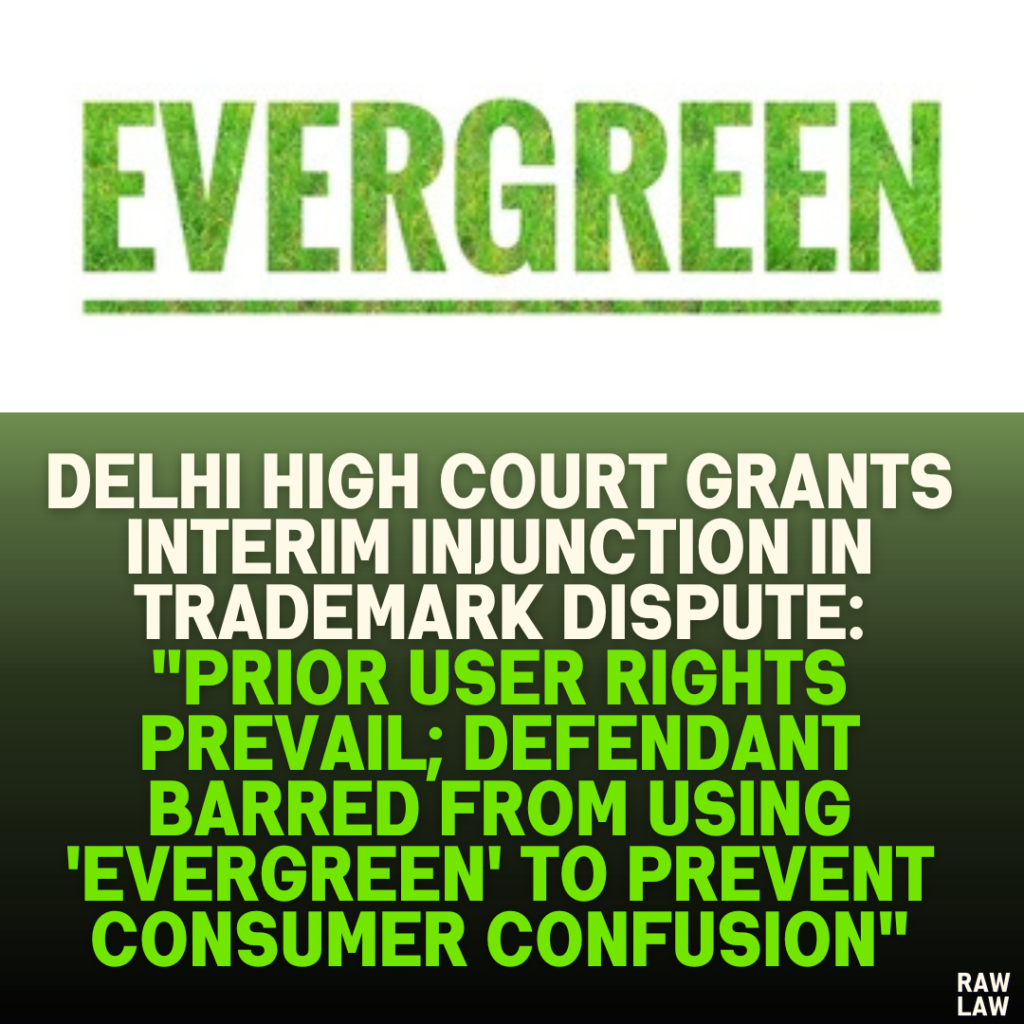Court’s Decision
The Delhi High Court issued an interim injunction against the defendant, restraining it from using the mark “JV Evergreen Sweets & Treats” or any deceptively similar mark. The Court found that the plaintiff, with its longstanding use of the “Evergreen” mark since 1963, had established goodwill and reputation, which outweighed the defendant’s claim of trademark registration in 2024. It ruled in favor of the plaintiff to prevent consumer confusion and protect public interest.
Facts
- Plaintiff’s Background:
- The plaintiff, operating since 1963, runs a sweet shop under the name “Evergreen Sweet House” in Green Park, Delhi.
- It has a registered trademark for “Evergreen” (1998) and uses distinct trade dress (color, design, layout) for branding.
- The plaintiff’s 2023 revenue was ₹38 crores, evidencing its market goodwill.
- Defendant’s Background:
- The defendant, a partnership firm established in 2020, operates under the name “JV Evergreen Sweets & Treats” in Lajpat Nagar, Delhi.
- The defendant registered its trademark for “Evergreen” in 2024 under Classes 35 and 43 and claimed significant online presence on platforms like Zomato and Swiggy.
- Cause of Action:
- A customer’s complaint alerted the plaintiff to the defendant’s operations.
- The plaintiff sent a cease-and-desist notice, but the defendant claimed that “Evergreen” is a generic term.
Issues
- Whether the plaintiff’s prior user rights override the defendant’s trademark registration.
- Whether the defendant’s mark is deceptively similar, leading to consumer confusion.
- Whether the term “Evergreen” is generic or entitled to trademark protection.
Petitioner’s Arguments (Plaintiff)
- The plaintiff emphasized its longstanding goodwill and reputation, tracing back to 1963.
- It argued that the defendant’s mark is deceptively similar, creating confusion and damaging its reputation.
- The plaintiff relied on legal precedents to assert that prior user rights prevail in passing off actions, irrespective of subsequent trademark registrations.
- It demonstrated the defendant’s intent to mislead by adopting similar trade dress and targeting the same consumer base.
Respondent’s Arguments (Defendant)
- The defendant claimed “Evergreen” is generic and cannot be monopolized.
- It argued that its mark, including the prefix “JV” and suffix “Sweets & Treats,” distinguishes it from the plaintiff’s.
- The defendant alleged the plaintiff delayed action, suggesting acquiescence.
- It highlighted its registered trademark and market presence, including better ratings on delivery platforms like Zomato.
Analysis of the Law
The Court applied key principles of trademark law and passing off:
- Passing Off Doctrine (Section 27(2), Trade Marks Act):
- Passing off protects prior user rights over goodwill and reputation, irrespective of subsequent registrations.
- The Court cited S. Syed Mohideen v. P. Sulochana Bai (2016) to affirm that the seniority of user rights prevails in disputes over similar trademarks.
- Tests for Deceptive Similarity (Cadila Health Care Ltd. v. Cadila Pharmaceuticals Ltd., 2001):
- The nature of the marks, similarity in goods, and likelihood of confusion among consumers are crucial in determining deceptive similarity.
- The Court noted that both parties used “Evergreen” for identical products (sweets and namkeens), heightening the risk of confusion.
- Generic vs. Distinctive Marks:
- The Court rejected the defendant’s claim of “Evergreen” being generic, noting its own trademark application treated the term as non-descriptive.
Precedent Analysis
- S. Syed Mohideen v. P. Sulochana Bai (2016): Established that prior user rights supersede trademark registrations.
- Cadila Health Care Ltd. v. Cadila Pharmaceuticals Ltd. (2001): Laid down factors to assess deceptive similarity.
- Wipro Enterprises v. Himalaya Wellness (2024): Reiterated that subsequent users adopting deceptively similar marks cannot plead innocence without plausible reasons.
Court’s Reasoning
- Prior User Rights:
- The plaintiff provided ample evidence (sales figures, registration documents, invoices) establishing goodwill since 1963.
- The defendant began operations in 2020 and failed to justify adopting a name identical to the plaintiff’s.
- Deceptive Similarity:
- The Court found the marks strikingly similar in appearance and usage. Both businesses targeted the same product category and consumer base, amplifying the likelihood of confusion.
- Even subtle differences like “JV” in the defendant’s mark were deemed inconsequential.
- No Acquiescence:
- The plaintiff promptly issued a cease-and-desist notice upon learning of the defendant’s mark in May 2024, negating claims of delay or acquiescence.
- Consumer Interest:
- Online platforms like Zomato and Swiggy increased the potential for confusion, with listings for both entities appearing under searches for “Evergreen.”
Conclusion
The Court restrained the defendant from using the mark “Evergreen” and ordered the removal of all listings bearing the infringing mark from delivery platforms (Zomato, Swiggy) and social media. The interim injunction protects the plaintiff’s goodwill and prevents consumer deception until the final adjudication.
Implications
- This ruling reinforces the primacy of prior user rights in trademark disputes.
- Businesses must adopt unique marks, supported by due diligence, to avoid legal challenges.
- The decision highlights the evolving challenges of trademark enforcement in the digital economy, where online platforms can exacerbate consumer confusion.
This judgment is a critical reference for businesses navigating the complexities of brand protection and competition.



